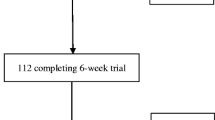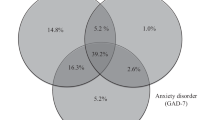Abstract
Purpose
Health-related quality of life (HRQoL) is important for long-term social functioning. It is considerably reduced in patients with depression. We studied the impact of HRQoL on treatment outcome in patients with unipolar depression. Furthermore, we analysed factors associated with HRQoL in inpatients with unipolar depression.
Methods
One hundred and eighty patients suffering from major depressive disorder were evaluated during their inpatient treatment by assessing admission and discharge depression severity and their HRQoL, using the Medical Outcomes Study 12-item Short Form (SF-12). Baseline and treatment variables associated with HRQoL were examined by regression analysis. Primary outcome measures were the Hamilton Rating Scale and the Beck Depression Inventory.
Results
HRQoL improved significantly during inpatient treatment. Lower HRQoL outcomes were strongly associated with higher age, somatic comorbidities, a recurrent depressive disorder and stronger depressive symptoms at admission. Additionally, patients with a complex treatment situation (high number of medications, antidepressant switch) showed stronger impairment of HRQoL. Personality disorders and additional psychotherapy did not predict HRQoL.
Conclusion
The inpatient treatment resulted in an increase of the SF-12 scores, although to a lower extent than depressive symptoms. Several factors negatively influence HRQoL, such as the presence of somatic and axis I psychiatric comorbiditites and a recurrent or severe depressive episode. Targeting somatic comorbidities in patients with unipolar depression seem to play an important role for HRQoL.
Similar content being viewed by others
References
Kessler, R. C., Berglund, P., Demler, O., Jin, R., Merikangas, K. R., & Walters, E. E. (2005). Lifetime prevalence and age-of-onset distributions of DSM-IV disorders in the National Comorbidity Survey Replication. Archives of General Psychiatry, 62(6), 593–602.
Lopez, A. D., Mathers, C. D., Ezzati, M., Jamison, D. T., & Murray, C. J. (2006). Global and regional burden of disease and risk factors, 2001: Systematic analysis of population health data. Lancet, 367(9524), 1747–1757.
Center for Control Disease and Prevention. (2014). Retrieved from http://www.cdc.gov/hrqol/concept.htm.
Hirschfeld, R. M., Montgomery, S. A., Keller, M. B., Kasper, S., Schatzberg, A. F., Moller, H. J., et al. (2000). Social functioning in depression: A review. Journal of Clinical Psychiatry, 61(4), 268–275.
Angermeyer, M. C., Holzinger, A., Matschinger, H., & Stengler-Wenzke, K. (2002). Depression and quality of life: Results of a follow-up study. International Journal of Social Psychiatry, 48(3), 189–199.
Berlim, M. T., Pargendler, J., Brenner, J., & Fleck, M. P. (2007). Significant improvement in the quality of life of Brazilian depressed outpatients 12 weeks following the start of antidepressants. Psychiatry Research, 153(3), 253–259.
Moussavi, S., Chatterji, S., Verdes, E., Tandon, A., Patel, V., & Ustun, B. (2007). Depression, chronic diseases, and decrements in health: Results from the World Health Surveys. Lancet, 370(9590), 851–858.
Lim, L., Jin, A. Z., & Ng, T. P. (2012). Anxiety and depression, chronic physical conditions, and quality of life in an urban population sample study. Social Psychiatry and Psychiatric Epidemiology, 47(7), 1047–1053.
Ravindran, A. V., Matheson, K., Griffiths, J., Merali, Z., & Anisman, H. (2002). Stress, coping, uplifts, and quality of life in subtypes of depression: A conceptual frame and emerging data. Journal of Affective Disorders, 71(1–3), 121–130.
Sobocki, P., Ekman, M., Agren, H., Runeson, B., & Jonsson, B. (2006). The mission is remission: Health economic consequences of achieving full remission with antidepressant treatment for depression. International Journal of Clinical Practice, 60(7), 791–798.
Pyne, J. M., Bullock, D., Kaplan, R. M., Smith, T. L., Gillin, J. C., Golshan, S., et al. (2001). Health-related quality-of-life measure enhances acute treatment response prediction in depressed inpatients. Journal of Clinical Psychiatry, 62(4), 261–268.
ten Doesschate, M. C., Koeter, M. W., Bockting, C. L., & Schene, A. H. (2010). Health related quality of life in recurrent depression: A comparison with a general population sample. Journal of Affective Disorders, 120(1–3), 126–132.
Rapaport, M. H., Clary, C., Fayyad, R., & Endicott, J. (2005). Quality-of-life impairment in depressive and anxiety disorders. American Journal of Psychiatry, 162(6), 1171–1178.
Kroenke, K. (2003). Patients presenting with somatic complaints: Epidemiology, psychiatric comorbidity and management. International Journal of Methods in Psychiatric Research, 12(1), 34–43.
Tylee, A., & Gandhi, P. (2005). The importance of somatic symptoms in depression in primary care. Primary Care Companion to the Journal of Clinical Psychiatry, 7(4), 167–176.
Judd, L. L., Akiskal, H. S., Maser, J. D., Zeller, P. J., Endicott, J., Coryell, W., et al. (1998). Major depressive disorder: A prospective study of residual subthreshold depressive symptoms as predictor of rapid relapse. Journal of Affective Disorders, 50(2–3), 97–108.
Bair, M. J., Robinson, R. L., Eckert, G. J., Stang, P. E., Croghan, T. W., & Kroenke, K. (2004). Impact of pain on depression treatment response in primary care. Psychosomatic Medicine, 66(1), 17–22.
Reed, C., Monz, B. U., Perahia, D. G., Gandhi, P., Bauer, M., Dantchev, N., et al. (2009). Quality of life outcomes among patients with depression after 6 months of starting treatment: Results from FINDER. Journal of Affective Disorders, 113(3), 296–302.
Matsunaga, M., Okamoto, Y., Suzuki, S., Kinoshita, A., Yoshimura, S., Yoshino, A., et al. (2010). Psychosocial functioning in patients with treatment-resistant depression after group cognitive behavioral therapy. BMC Psychiatry, 10, 22.
Caruso, R., Rossi, A., Barraco, A., Quail, D., & Grassi, L. (2010). The Factors Influencing Depression Endpoints Research (FINDER) study: Final results of Italian patients with depression. Annals of General Psychiatry, 9, 33.
Wells, K. B., Sherbourne, C., Schoenbaum, M., Duan, N., Meredith, L., Unutzer, J., et al. (2000). Impact of disseminating quality improvement programs for depression in managed primary care: A randomized controlled trial. JAMA, 283(2), 212–220.
Bech, P. (2005). Social functioning: Should it become an endpoint in trials of antidepressants? CNS Drugs, 19(4), 313–324.
Trivedi, M. H. (2001). Sensitizing clinicians and patients to the social and functional aspects of remission. Journal of Clinical Psychiatry, 62(Suppl 19), 32–35.
Wisniewski, S. R., Rush, A. J., Bryan, C., Shelton, R., Trivedi, M. H., Marcus, S., et al. (2007). Comparison of quality of life measures in a depressed population. The Journal of Nervous and Mental Disease, 195(3), 219–225.
Frank, E., Prien, R. F., Jarrett, R. B., Keller, M. B., Kupfer, D. J., Lavori, P. W., et al. (1991). Conceptualization and rationale for consensus definitions of terms in major depressive disorder. Remission, recovery, relapse, and recurrence. Archives of General Psychiatry, 48(9), 851–855.
Härter, M., Klesse, C., Bermejo, I., Schneider, F., & Berger, M. (2010). Unipolar depression: Diagnostic and therapeutic recommendations from the current S3/National Clinical Practice Guideline. Deutsches ärzteblatt International, 107(40), 700–708.
Hiller, W., Zaudig, M., & Mombour, W. (2005). IDCL: ICD-10 Checklists. Göttingen: Hogrefe.
Hamilton, M. (1960). A rating scale for depression. Journal of Neurology, Neurosurgery and Psychiatry, 23, 56–62.
Beck, A. T., Ward, C. H., Mendelson, M., Mock, J., & Erbaugh, J. (1961). An inventory for measuring depression. Archives of General Psychiatry, 4, 561–571.
Endicott, J., Spitzer, R. L., Fleiss, J. L., & Cohen, J. (1976). The global assessment scale. A procedure for measuring overall severity of psychiatric disturbance. Archives of General Psychiatry, 33(6), 766–771.
Guy, W. (1976). Clinical Global Impressions (CGI). In: ECDEU Assessment Manual for Psychopharmacology US Department of Health, Education, and Welfare Publication (ADM) 76–338 (pp. 218–222). Rockville, MD: National Institute of Mental Health.
First, M., Gibbon, M., & Spitzer, R. (1996). Structured clinical interview for DSM-IV axis II disorders. New York NY: Biometrics Research Dept, NewYork State Psychiatric Institute.
Ware, J, Jr, Kosinski, M., & Keller, S. D. (1996). A 12-Item Short-Form Health Survey: Construction of scales and preliminary tests of reliability and validity. Medical Care, 34(3), 220–233.
Collegium Internationale Psychiatriae Scalarum (CIPS). (2005). Internationale Skalen für Psychiatrie. Göttingen: Beltz Test.
Ware, J. E., Kosinski, M., & Keller, S. D. (1995). SF-12: How to score the SF-12 physical and mental health summary scales (2nd ed.). Boston: The Health Institute, New England Medical Center.
CIPS. (2005). International scales for psychiatry. Göttingen: Beltz Test GmbH.
Cohen, J. (1992). A power primer. Psychological Bulletin, 112(1), 155–159.
Seemüller, F., Riedel, M., Obermeier, M., Bauer, M., Adli, M., Kronmüller, K., et al. (2010). Outcomes of 1014 naturalistically treated inpatients with major depressive episode. European Neuropsychopharmacology, 20(5), 346–355.
Daly, E. J., Trivedi, M. H., Wisniewski, S. R., Nierenberg, A. A., Gaynes, B. N., Warden, D., et al. (2010). Health-related quality of life in depression: A STAR*D report. Annals of Clinical Psychiatry, 22(1), 43–55.
Garcia-Campayo, J., Ayuso-Mateos, J. L., Caballero, L., Romera, I., Aragones, E., Rodriguez-Artalejo, F., et al. (2008). Relationship of somatic symptoms with depression severity, quality of life, and health resources utilization in patients with major depressive disorder seeking primary health care in Spain. Primary Care Companion to the Journal of Clinical Psychiatry, 10(5), 355–362.
Bauer, M., Monz, B. U., Montejo, A. L., Quail, D., Dantchev, N., Demyttenaere, K., et al. (2008). Prescribing patterns of antidepressants in Europe: Results from the Factors Influencing Depression Endpoints Research (FINDER) study. European Psychiatry, 23(1), 66–73.
Peveler, R., Kendrick, T., Buxton, M., Longworth, L., Baldwin, D., Moore, M., et al. (2005). A randomised controlled trial to compare the cost-effectiveness of tricyclic antidepressants, selective serotonin reuptake inhibitors and lofepramine. Health Technol Assess, 9(16), 1–134, iii.
Dunner, D. L., Kwong, W. J., Houser, T. L., Richard, N. E., Donahue, R. M., & Khan, Z. M. (2001). Improved health-related quality of life and reduced productivity loss after treatment with bupropion sustained release: A study in patients with major depression. Primary Care Companion to the Journal of Clinical Psychiatry, 3(1), 10–16.
Kruijshaar, M. E., Hoeymans, N., Bijl, R. V., Spijker, J., & Essink-Bot, M. L. (2003). Levels of disability in major depression: Findings from the Netherlands Mental Health Survey and Incidence Study (NEMESIS). Journal of Affective Disorders, 77(1), 53–64.
Kennedy, N., Foy, K., Sherazi, R., McDonough, M., & McKeon, P. (2007). Long-term social functioning after depression treated by psychiatrists: A review. Bipolar Disorders, 9(1–2), 25–37.
Trivedi, M. H., Rush, A. J., Wisniewski, S. R., Warden, D., McKinney, W., Downing, M., et al. (2006). Factors associated with health-related quality of life among outpatients with major depressive disorder: A STAR*D report. Journal of Clinical Psychiatry, 67(2), 185–195.
Köhler, S., Unger, T., Hoffmann, S., Steinacher, B., Fydrich, T., & Bschor, T. (2013). Comparing augmentation with non-antidepressants over sticking to antidepressants after treatment failure in depression: A naturalistic study. Pharmacopsychiatry, 46(2), 69–76.
Ruhe, H. G., Huyser, J., Swinkels, J. A., & Schene, A. H. (2006). Switching antidepressants after a first selective serotonin reuptake inhibitor in major depressive disorder: A systematic review. Journal of Clinical Psychiatry, 67(12), 1836–1855.
Conflict of interest
There are no competing financial interests in relation to the work described.
Author information
Authors and Affiliations
Corresponding author
Rights and permissions
About this article
Cite this article
Köhler, S., Unger, T., Hoffmann, S. et al. The relationship of health-related quality of life and treatment outcome during inpatient treatment of depression. Qual Life Res 24, 641–649 (2015). https://doi.org/10.1007/s11136-014-0811-8
Accepted:
Published:
Issue Date:
DOI: https://doi.org/10.1007/s11136-014-0811-8




